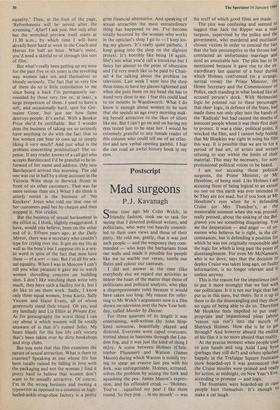Postscript
Mad surgeons
P.J. Kavanagh
om e time ago Mr Colin Welch, in friendly fashion, took me to task for saying that I detested political writers, and politicians, who were too heavily commit- ted to their own views and those of their party. He told me, gently, that it was just such people — and the weaponry they com- manded — who kept the barbarians from our walls and made it possible for people like me to warble our verses, tootle our flutes and colour our canvases.
I did not answer at the time (like everybody else we regard our activities as nearer the heart of the matter than those of politicians and political analysts, who play a disproportionate role) because it would have taken too long. My reason for refer- ring to Mr Welch's arguments now is a film shown on television over the New Year holi- day, called Murder by Decree.
For three quarters of its length it was entertaining, well-written (by John Hop- kins) nonsense, beautifully played and directed. Everyone wore caped overcoats, trotted about in hansoms through the Lon- don fog, and it was just the kind of thing I enjoy. A scene between Holmes (Chris- topher Plummer) and Watson (James Mason) during which Watson is noisily try- ing to spear an evasive last pea with his fork, was unforgettable. Holmes, irritated, solves the problem by seizing the fork and squashing the pea. James Mason's expres- sion, and his offended croak — 'Holmes. You've...squashed my pea! I like them round. So they pop... in my mouth' — was the stuff of which good films are made.
The plot was confusing and seemed to suggest that Jack the Ripper was a mad surgeon, supervised by the police and the government, who murdered and mutilated chosen victims in order to conceal the fact that the heir-presumptive to the throne had contracted an unfortunate marriage and sired an unsuitable heir. The plot has to be mentioned because it gave rise to the ex- traordinary last quarter of a hour during which Holmes confronted (in a strange, surreal room) the Prime Minister, the Home Secretary and the Commissioner of Police, each standing in what looked like an accused person's dock. With Holmesian logic he pointed out to these personages that their logic, in defence of the State, had made them not only play into the hands of the 'Radicals' but had caused the deaths of innocent people whom it was their first dutY to protect. It was a clear, political point, it wrecked the film, and I cannot help feeling that Mr Hopkins was right in using his film this way. It is possible that we are in for a period of bad art, of artists and writers refusing to stay within the limits of their material. This may be necessary, for non- professional political voices to be heard. I am not accusing those political surgeons, the Prime Minister, or Mr Heseltine, of being mad. Like Holmes 1 am accusing them of being logical to an extent no one on this earth was ever intended to be They are not mad, but if you look at Mr Heseltine's eyes when he is defending Cruise (or Mrs Thatcher's, at the memorable moment when she was pressed, really pressed, about the sinking of the Bei- grano) you see something disquieting. YOU see the desperation — and anger — of so- meone who believes he is right, in the cir- cumstances, but is defending a position for which he was not originally responsible and the logic for which is long past the point of disentanglement. For even Mr McNamara, who is no dove, says that the decision to deploy Cruise was taken long ago, on faulty information, is no longer relevant and Is useless anyway. This is the reason for the impatience (not to put it more strongly) that we feel with our politicians. It it is not our logic that has put us in this mess, but theirs. So it is up to them to do the disentangling and they show no signs of being able to do so. Therefore Mr Hopkins feels impelled to put inap- propriate and impassioned pleas (about `reason run riot') into the mouth of Sherlock Holmes. How else is he to get through? And however absurd the ending of his film it is no more absurd than realitY.
At the precise moment when people used to join hands and sing Auld Lang Syne (perhaps they still do?) and others splashed happily in the Trafalgar Square fountains (now boarded-up) it was announced that the Cruise missiles were primed and readY for action, at midnight, on New Year's Eve, according to promise — and logic.
The fountains were boarded-up in case people hurt themselves. It's enough to make a cat laugh.






































 Previous page
Previous page